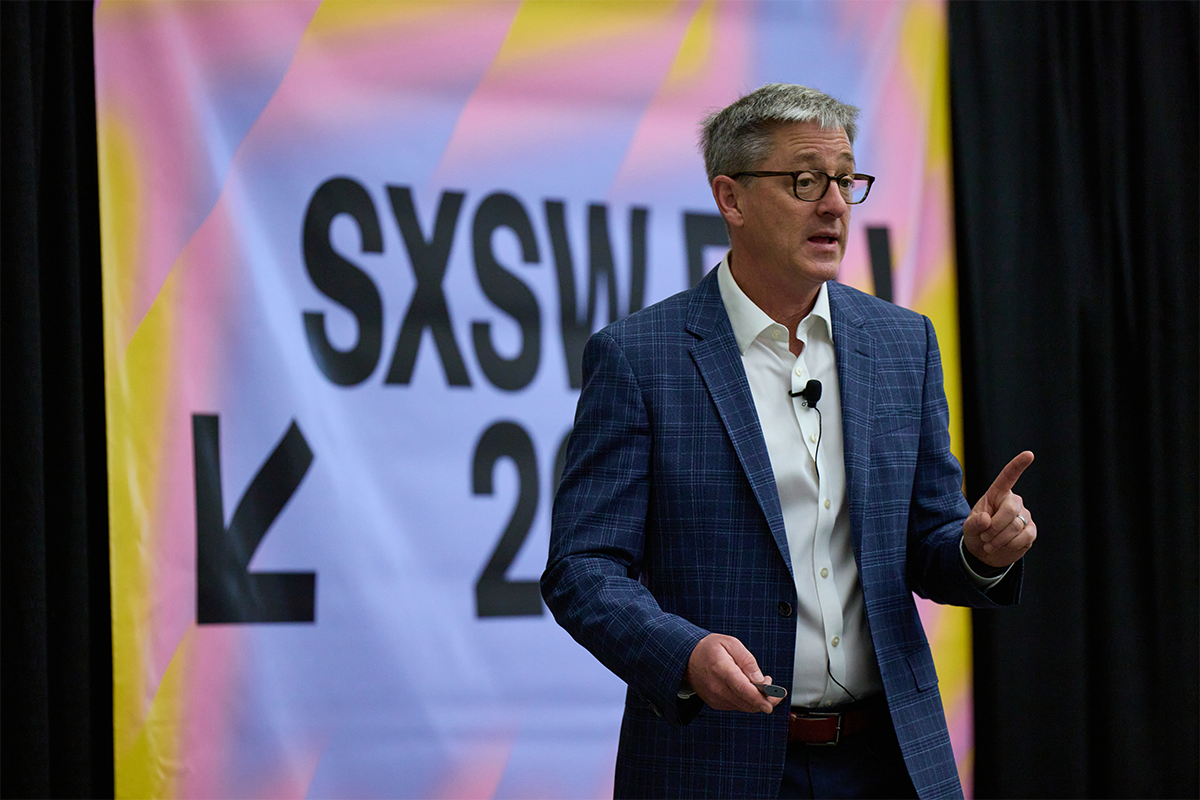
Gen Z has its detractors, but count Timothy Law Snyder, Ph.D., president of Loyola Marymount University, as one of its champions.
“I have hope for our future knowing that Solidarities are at the helm, and we are accompanying them on the path to progress,” President Snyder told a crowd on March 7, 2023, at South by Southwest in Austin, Texas. Founded in 1987, SXSW is renowned for its annual conference and festivals that celebrate the convergence of tech, film, music, education, and culture. President Snyder’s participation in the conference is part of the university’s brand and visibility initiatives, led by Marketing, Communications, and External Relations, that aim to extend our reach beyond the bluff through national thought leadership engagements.
“As the most diverse group in America’s history,” President Snyder said, “‘Gen Z — what I refer to as the Solidarity Generation — is emboldened by its profound care for one another, proclivity for purpose, and its interconnectivity. The Solidarity Generation’s zeal for unity and social justice is challenging the status quo and holding institutions accountable in ways unprecedented. We, in higher education, have a responsibility to our students and to our future, to meet the moment and be a partner in transformation.”
President Snyder’s expertise in generational theory, specifically the education of Millennials and Gen Z, lends a unique perspective to understanding this current cohort of students, especially in a post-pandemic world. His 30 years of experience in Jesuit higher ed informs President Snyder’s understanding of generational theory and his abiding respect for the Solidarity Generation. He pointed out that the salient feature of every generation is they “diss their youth,” and he cautioned that while generational theory is important, it shouldn’t be applied to individuals.
During his presentation, President Snyder called out the stereotypes of Gen Z (they can’t look up from their phones; they’re obsessed with TikTok dance videos; they don’t want to work) and the contradictions (as a possible reaction to technology, they are hungry for analogue such as flip phones, vinyl, library cards and Polaroids; and their neo-Luddite preferences demonstrate a prioritization of self-care and mental health). While fascinating and sometimes funny, these stereotypes and contradictions are often fodder for fluff pieces.
“What really impresses me about this rising generation: their sense of solidarity,” President Snyder said.
He supports that view with examples of social justice activism by Solidarity Generation members, such as Parkland shooting survivor David Hogg’s feud with Laura Ingraham and his rallying cry: “you come after one of us, you come after all of us.” And 15-year-old activist Mari Copeny, aka Little Miss Flint, who addressed the water crisis in her hometown with “We need leaders that have a heart and care about everyone.”
The range of issues President Snyder recounted as the concerns of Solidarities reads like a catalog of anxieties for a troubled world, among them climate change, gun violence, racial justice. President Snyder drew directly from his experience with LMU students. From the climate change activism of Lions like Kevin Patel, members of the Sunrise Movement, and fighting for racial justice as we have seen with Black at LMU, and the Brothers of Consciousness, and several campus groups, our students do not operate in a vacuum, “they are in solidarity with other Solidarities.”
President Snyder urged his fellow educators to take the Solidarity Generation seriously. “We have to be their allies and not expect them to do all the work … We, too, must take a stand; that doesn’t mean blindly adopting their positions, but discerning where they, and we, are coming from, and working with them to reach a greater understanding.” He offered examples from LMU, such as listening sessions on anti-racism and racial justice; working with students and LMU’s financial team to divest from fossil fuel investments; and responding to students’ concerns about raising the salaries of the university’s lowest paid employees to $21 an hour.
President Snyder emphasized “that we give students some leverage and say in what we do. We take this generation more seriously than we have — in terms of the input they can provide that is in ways generational. We partner with them.”
Listen to President Snyder’s SXSW presentation, “In Students We Trust: The Solidarity Generation” here.



